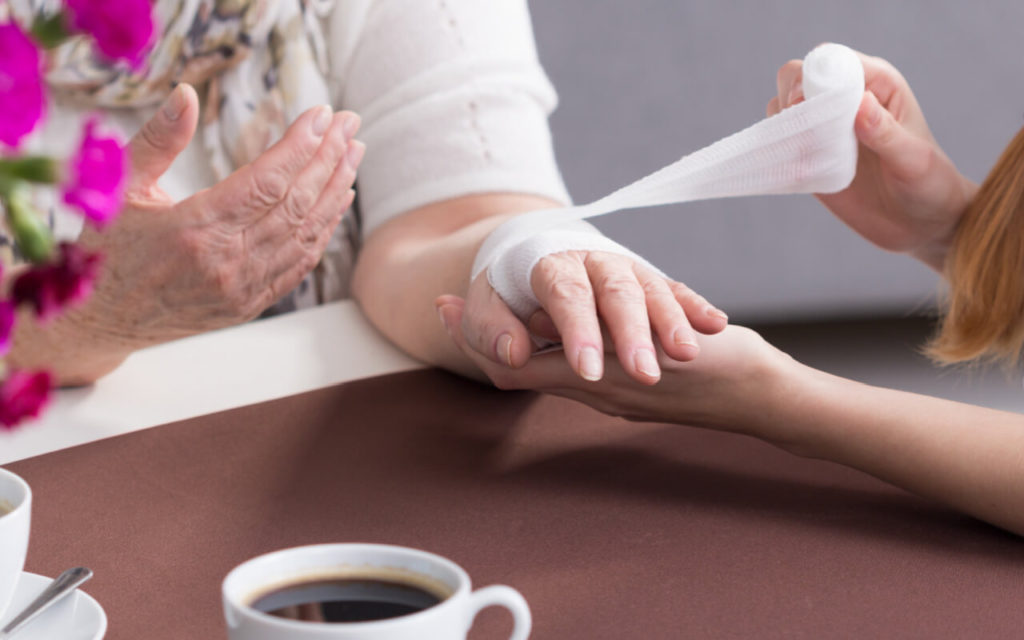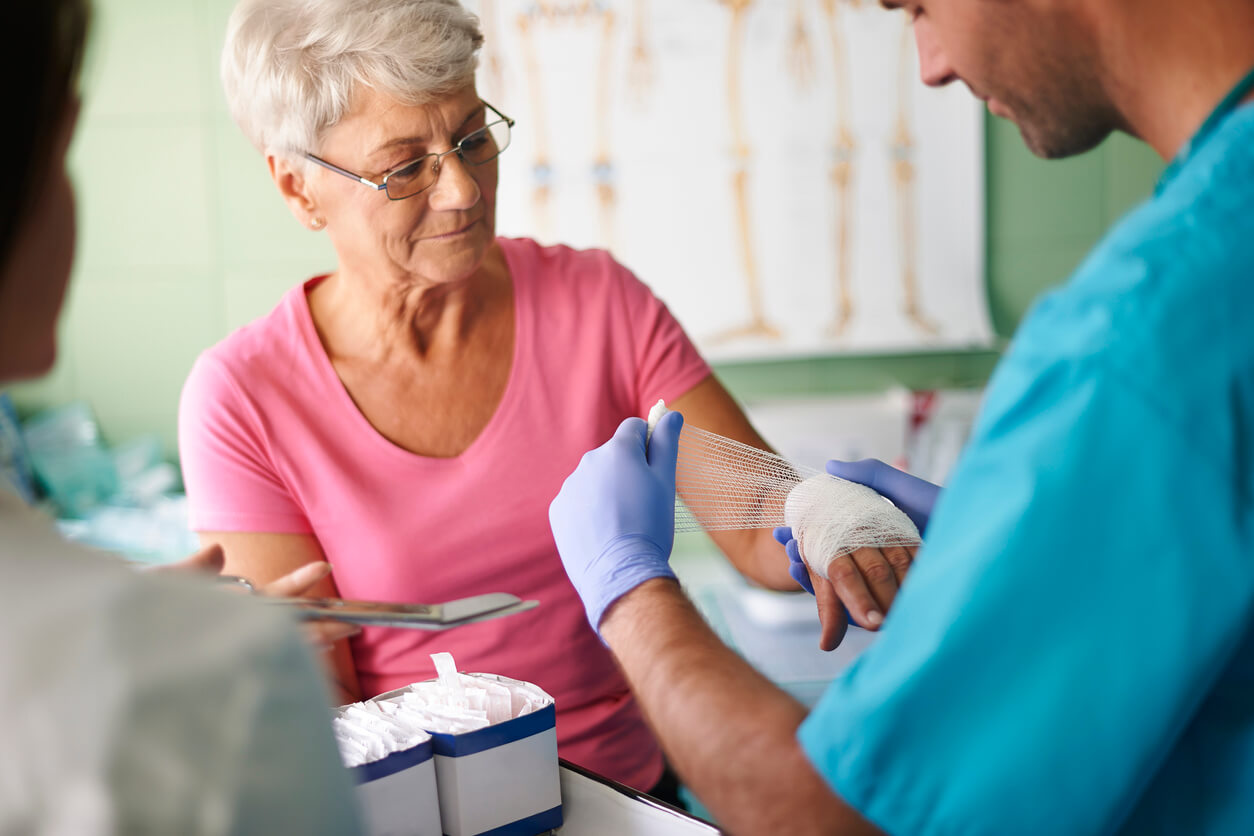What is wound Care?
Wound care for seniors is not much different than what it denotes at first glance in that a patient’s wound is addressed, monitored and hopefully improved with active care. The wound healing process is slow and will inevitably frustrate the patient as well as caring family members.
The wound care process typically begins with a comprehensive assessment of the wound performed in a medical setting. Once the assessment is complete, the doctor recommends the optimal treatment. The wound is cleaned in-depth to reduce the chances of infection. The doctor also applies a dressing. However, wound care does not end after the application of the initial dressing. It might be necessary to visit a wound care center, or alternatively, receive wound care in the home from a nurse or other homecare service provider. The specific treatment method that is ideal for one patient’s issue might not be ideal for the next and so on. As an example, the elimination of dead wound tissue to promote healing through a debridement process certainly helps.
Compression stockings/wraps fitted to the patient to boost circulation, hyperbaric oxygen therapy to boost blood transmission for the purpose of healing and negative pressure therapy for fluid removal are all legitimate treatment options with merit. However, the common theme that emerges in the context of wound care is that most patients greatly benefit from in-home medical assistance provided by an experienced professional. If the senior citizen you love so much has a wound, don’t be afraid to ask for assistance.
How does older age affect wound Healing?
Wound healing changes as the aging process unfolds. A wound that forms in one’s early 70s has the potential to last for months or even years. The aging process, especially in the golden years, slows the tissue healing process. Therefore, it is safe to assume the senior in your life with a wound will struggle with it for the foreseeable future. What matters most is your response to this setback. When in doubt, don’t hesitate to ask for assistance from an elderly wound care treatment specialist.
What causes poor wound healing in the Elderly?
Poor wound healing in the elderly occurs because the skin struggles to heal as quickly as it did when it was younger. The aging process combined with the inability of immune cells to guard against harmful bacteria hikes the chances of a nasty skin infection all the more.
Fast forward to the inevitable attempt to regenerate and the reduced rate of cell division ultimately causes the pace of skin regrowth to decline. The primary takeaway is that elderly wounds that won’t heal quickly or thoroughly on their own if neglected. There is no shame in asking for assistance from a homecare specialist.
How do you diagnose skin wounds in the Elderly?
Inflammation is the most common sign of an infected wound, be it in a senior or an individual of another age cohort. An infected skin wound is likely to be especially red in color, hot, painful, swollen and potentially even non-functional.
Wounds that won’t heal in Elderly
The human body becomes less capable of repairing its skin as the years pass. The skin lacks the stem cells and growth factors necessary to quickly and efficiently repair skin after a wound forms. Malnutrition along with chronic disease including that of the blood vessel variety are also that much more likely to develop in seniors. If necessary, geriatric wound care or treatment through urgent care for seniors is a last resort for wounds that won’t heal in elderly.

How to treat wounds in Elderly
The wound itself requires cleaning yet neglecting the surrounding area is a major mistake. Instead of attempting to pull the skin, lightly dab it with an antibiotic ointment. Bacitracin, Polysporin and Neosporin are all excellent antibiotic ointments for wound treatment. Use a sterilized bandage to conceal the wound. Repeat these steps a couple times per day to expedite the healing process.
If the wound is especially deep or large, it will require professional medical assistance including homecare service. Furthermore, if you find the wound is slow to heal, don’t hesitate to ask for assistance from a homecare specialist.
Skin tear management Elderly
Skin tear management requires attention to detail, medical supplies and experience. A senior saddled by skin tears in the context of wound management will require professional assistance in the form of a wound care specialist or an in-home care provider at the bare minimum.
Wound care for elderly thin Skin
The skin thins with the aging process, necessitating ongoing wound care. Tears in the skin are best treated with a systematic approach. Saline is used to cleanse the wound, minimize bleeding and eliminate clotting. The appropriate wound dressing is to be applied based on the unique characteristics of the wound.
Home remedies for elderly open wounds
Open wounds that are relatively small in size might not benefit from medical treatment. However, the use of OTC antibiotic ointments make it that much easier to maintain a clean wound. Some examples of home remedies that help treat open wounds include garlic, aloe vera, turmeric and coconut oil. Turmeric is especially helpful in the context of wound treatment as it enhances the healing process with collagen modulation.
Turmeric-based home remedies for open wounds and other DIY concoctions are not enough alone. DIY home remedies for open wounds will prove ineffective if the wound is large or deep. There is also the potential for the patient’s unique biochemistry to interfere with the healing process. The use of one such DIY solution might not alleviate the pain from the wound yet they have the potential to minimize the pain, especially in between periods of medical treatment. Give the healing properties of one or several home remedies a chance, always ensure the wound is disinfected and don’t hesitate to lean on a homecare services provider for assistance with wound care.


